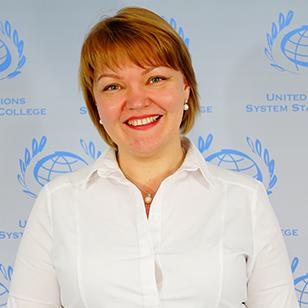Do course participants actually apply what they learn? One story speaks volumes
One of the most critical questions managers, supervisors and human resources professionals ask me when staff members request – or are encouraged – to attend a training course is, “What are the benefits to our team, unit, or organization at large?” How can we demonstrate the link between a training in terms of better individual and organizational performance, and what is the evidence of this improved performance after the training ends? Do participants apply what they learn, and how much is attributed to the training course they attended? What are the mid-term results and benefits for the organizations that send (and, critically, fund) the participation of their staff in trainings?
These questions about the return on investment are very much part of the DNA of results-based management (RBM). Would not the UNSSC course on Results-based Management to Support Implementation of the 2030 Agenda be a perfect opportunity to see what happens after participants return to their offices?
This comprehensive results-based management course is designed to equip UN staff with the knowledge and skills to apply RBM principles and tools (causality analysis, theory of change, results chain, indicator frameworks) in supporting integrated and multi-dimensional UN programming in the context of the 2030 Agenda for Sustainable Development.
Surveying alumni
To identify the results of the course, UNSSC surveyed the alumni of the last seven RBM trainings from 2017 to 2019. (About a quarter of all attendees responded.) More than 92 per cent of participants reported that they had applied the acquired knowledge and skills in their work, while 52 per cent applied the skills often, and 11 per cent applied them frequently. Around 74 per cent of participants confirmed that they were fully or very confident in applying the knowledge and skills they had acquired, and 81 per cent found that it was extremely or very important to their job success to apply the knowledge and skills. Respondents reported similar results across agencies and duty stations.
How the knowledge was used
When asked to provide examples of how they utilized the knowledge in their work, participants cited: developing project proposals, creating a results matrix for project development, designing results log-frames, designing relevant indicators, designing concept notes, developing department budgets, conducting a brownbag session to transfer knowledge to colleagues, conducting sessions on the theory of change, among others.
What factors enabled them to apply the knowledge they acquired? Most participants indicated the ‘opportunity to apply’ (67 per cent), ‘the importance of the knowledge/skills to their job success’ (67 per cent), ‘confidence to apply’ (56 per cent), and ‘support received from their supervisor’ (37 per cent).
Less than 7 per cent of respondents did not apply the knowledge and skills from the course. The key factors that prevented them from applying the knowledge and skills they had gained were: ‘no/insufficient opportunity to apply’ (57 per cent), ‘application of knowledge and skills not supported by systems and processes’ (43 per cent).
Learning that can be applied, monitored and evaluated
As we can see, the RBM course generates results for both participants and for their organizations. Well-designed and with a clear focus, these courses deliver knowledge that can be applied, monitored and evaluated – enabling the UN to deliver concrete results and report these results to the public, governments, development partners and donors. Achieving tangible results in the lives of people we serve is at the heart of the UN’s work. Sign up for the next edition of the Results-based Management to Support Implementation of the 2030 Agenda” course which will be held from 27–30 April, 2020 in Bonn, Germany. The enrolment deadline is 19 April.
This course is part of the UNSSC Sustainable Development Learning Package offered to UN Resident Coordinator Office (RCO) staff: a special discount of $1,000 will be provided to UN staff working in RCOs as part of UNSSC’s targeted support to the UN reform process through sustained and facilitated learning and leadership development programmes.
Participate and become a results-based management leader in your UN organization by applying specific RBM tools in planning, project/programme proposal drafting, monitoring, reporting, and evaluation.
